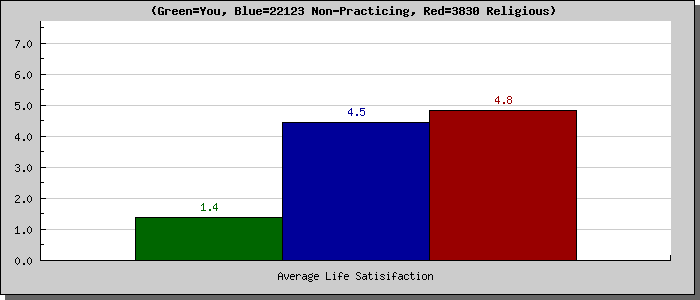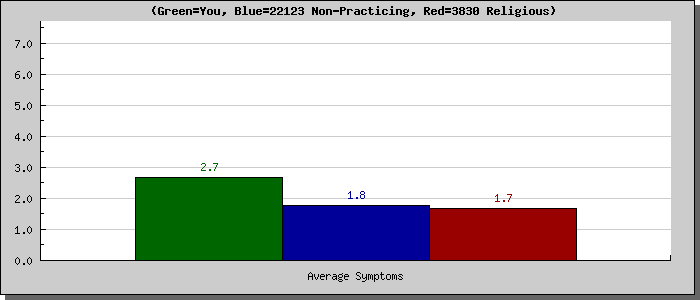The scale you completed on the
first page was the "Satisfaction with Life Scale," developed by Ed
Diener, the leading researcher on happiness, at the University of
Illinois.
The scale is a measure of your general happiness
level. Despite its simplicity, the scale has been found to do a good
job of measuring people's general state of "subjective well-being." It
is widely used, in many nations.
We are interested in measuring happiness on this site because
many studies have found that religious people are happier than
non-believers, and some have found that politcally conservative people
are slightly happier than are political liberals, even after
controlling statistically for religiosity. A recent Gallup survey found
that religiosity was associated with better mental health for
Republicans, but it didn't make a difference for Democrats. We want to
investigate these complex relationships among happiness, morality,
religion, and ideology.
In the graph below, your score is shown in green.
The scores of all people who have taken the scale on our site and who
say that they go to religious services never, or just a few times a
year, are shown in blue. The scores of all people who have taken the
scale on our site and who said (during registration) that they go to
religious services a few times a month or more are shown in red. Scores
run from 1 (the lowest possible score, least happy) to 7 (the highest
possible score, most happy).

In addition, we asked you some questions on the second page about your
mental health. That recent Gallup poll showed that conservatives and
religious people report having better mental health when asked using a
single question ("how would you rate your mental health?"). We want to
see if their finding holds up using a more specific scale, so we asked
you to report on a variety of symptoms related to depression and
anxiety, which are the most common kinds of mental health symptoms that
people report. In the graph below, your score is shown in green.
High scores mean MORE mental health complaints. Scores run from 1 (the
lowest possible score, no symptoms at all) to 5 (the highest possible
score, people who responded "extremely" to all items). As before, the
blue bar shows the score of the less religious people; the red bar shows
the average score of the most religious people.

To learn more about Diener's research on happiness, and about his
"Satisfaction with Life" scale and how to compare your score to others,
please see Diener's website.
|

